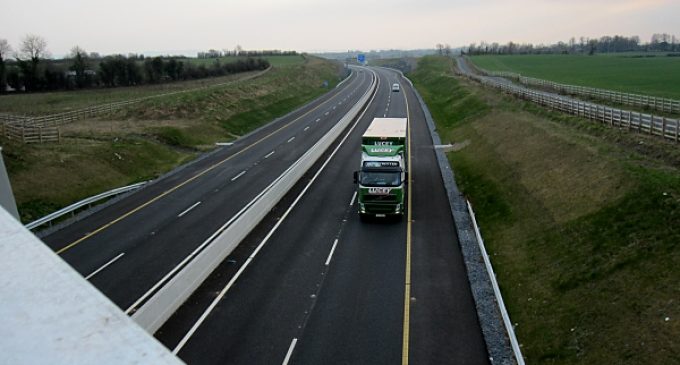Resources for Budget 2018 €400 million more than estimated

Ibec has called on the Government to show further ambition in meeting Ireland’s critical infrastructure and demographic needs. Launching the group’s Budget 2018 submission, Ibec said that the Government has more within its power to spend on investment in much needed infrastructure, education and training, if it so chooses.
Speaking at the launch of the submission, Ibec Director of Policy and Public Affairs, Fergal O’Brien stated: “The Irish economy is at a critical juncture. While it continues to grow strongly, we are also entering a period of uncertainty due to international external pressures from Brexit, and risks to global trade and investment. Domestically, we are facing chronic shortages in necessary infrastructure such as transport and housing, due to years of under investment. This is coupled with a shift in our demographics, with the population expected to grow by about one million over the next 15 years, adding to the burden on our public infrastructure.
“Ibec has consistently drawn attention to the limited ambition from Government when it comes to the delivery of key infrastructure projects. Its most recent economic statement shows that this lack of investment is now completely unwarranted due to our high growth rates. We are a very wealthy and high income globalised economy, with immense business substance and a growing working age population to support this, but without sufficient infrastructure to match. We welcome the recent Government decision to reverse its debt reduction strategy of 45% of GDP, to allow for more capital investment. But the Government can, and must, do even more to implement long-term planning for our economy and place a sharper focus on increased infrastructure and education investment with the Exchequer funds now available. Better use must also be made of public-private partnerships (PPPs) and other non-Exchequer finance, such as from the European Investment Bank. The path towards this should begin with Budget 2018.”
Ibec has identified the following key policy proposals for Budget 2018:
1. Additional fiscal space is available and must be used to increase investment. The economy is growing quickly and sustainably. Despite this, there is a serious risk that under investment in public infrastructure, coupled with strong demographic pressures, will lead to overheating if action is not taken. The 2015 GDP growth surge has afforded us a potential additional €7 billion in investment capacity between 2018 and 2021 (€400 million in 2018) if the fiscal rules are obeyed. The decision to forgo this additional space by excluding the 2015 GDP figure from fiscal space calculations would be a mistake. This additional spending capacity should not be used for day-to-day spending and by channelling it into one-off investment projects we can insulate the public finances from any future shocks.
2. The Budget must be Brexit proofed. Brexit leaves the Irish economy exposed, particularly the indigenous sectors most reliant on the UK market. It is vital we take decisive steps in Budget 2018 to offset such risks. In order to support businesses, a multi-annual framework for funding Brexit mitigation should be put in place, targeted at supporting innovation, market diversification, upskilling and capital expenditure in equipment and machinery.
3. Focus on creating a high-skilled economy. Unemployment is falling rapidly and we expect it to average less than 6% in 2018. However, Ireland’s prime age employment to population ratio remains 29th out of 34 OECD countries, and female labour force participation remains low. In addition, skills gaps are becoming more acute. We must prioritise education and life-long training, by reforming our tax and share options systems to attract high-skilled workers, and improving childcare affordability and quality, by targeting existing resources better.
4. Defend our Foreign Direct Investment model where necessary and improve it where possible. Recent years have seen the advent of the OECD’s Base Erosion Profit Shifting (BEPS) process, the re-emergence of Common Consolidated Corporation Tax Base (CCCTB) proposals in Europe, and the prospect of US corporate tax reform. Despite recent challenges, Ireland’s model of a small, business-friendly open economy within Europe has continued to demonstrate much substance, with accelerating investment and employment in highly globalised industries. Ireland’s corporation tax strategy is a major part of our offering and must be safeguarded. Cost neutral administrative changes to the R&D tax credit, in particular, could significantly improve the benefits of an already successful scheme.
5. Put in place proper 21st century infrastructure to make sure Ireland maintains its competitive edge. Ibec has consistently drawn attention to a lack of ambition when it comes to the Government’s delivery of key infrastructure projects. In the early years of the economic crisis, this was unfortunate, if understandable, in the context of Ireland’s fiscal position. Today it is unwarranted. Along with increased Exchequer investment, better use must be made of public-private partnerships (PPPs), other non-Exchequer finance (such as the European Investment Bank), and disposal of some of the underutilised assets among the €100 billion of physical assets on the Government’s books. Efficient delivery will be key and must be led by a comprehensive National Planning Framework.
“The Government must use the opportunity of Budget 2018 to build on the success and substance of the Irish business model, with its compelling track record of recovery from global recession to once again being Europe’s fastest growing economy. Our analysis shows that it has more scope to invest than previously estimated – it would be both sensible and prudent to use these resources to more urgently address the economy’s severe capacity constraints,” Mr O’Brien concluded.







